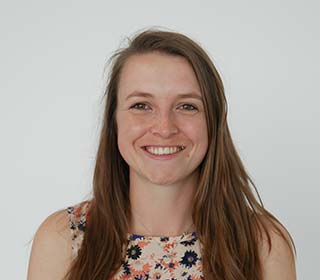Dr Rosanna Walters-Symons
Senior Lecturer
School of Health & Wellbeing
01752 636700 Ext:2079
rwalters-symons@marjon.ac.uk

Role Summary
Rosanna teaches across a range of undergraduate and post-graduate Psychology, Sport and Exercise Psychology and research (MRes) programmes, with particular interest placed on engaging students in how psychology can be applied to performance contexts.
Rosanna specialises in the psychology of sporting performance and well-being. Her research fields are cognitive psychology, performance psychology and quantitative methods, with a particular interest in equestrian sport and participation.
Qualifications
BPS Chartered Psychologist
Doctorate in Sport Psychology, University of Exeter
PGCert Learning and Teaching in Higher Education, Advance HE
BSc (Hons) Psychology with Sport Science, University of Exeter
Level 3 certificate in Equestrian coaching (1st4sport, UK Sport)
Advanced safeguarding, Child Protection Company
Mental Health First Aider, Mental Health First Aid England
FAA Level 3 Emergency First Aid at work
Teaching
Rosanna is module lead for a number of undergraduate and postgraduate psychology courses. Subjects and topic areas include:
- Psychology
- Occupational psychology
- Cognitive psychology
- Sport and Exercise Psychology
- Attention and concentration
- Performance anxiety
- Positive psychology
- Quantitative Research Methods
Key duties include lecturing and assessment as well as pastoral care and post-graduate supervision.
Research
Rosanna's research interests include:
- Attention and concentration in sporting performance, examining the critical perceptual cognitive factors that enable elite performance of athletes and officials in sport. Furthermore, my research looks to understand how specific characteristics can be applied to improve performance.
- PhD Brief Synopsis: My PhD thesis examined the functional mechanisms underpinning the Quiet Eye (Vickers, 1996) - an objective measure of visuo-motor control. Through the use of eye-tracking technology my thesis tackled some difficult questions surrounding these functional mechanisms that underpin the potential benefits of the Quiet Eye for sports performance. The research specifically focused on golf putting however the findings can be applied to other targeting sports.
- Coach-athlete relationships and mental health literacy in Equestrian sport
Publications
Walters-Symons, R. M., Wilson, M. R., Klostermann, A, & Vine, S. J. (2018). Examining the response programming function of the Quiet eye: Do tougher shots need a quieter eye? Cognitive processing, 19, 47-52.
Walters-Symons, R. M., Wilson, M. R. & Vine, S. J. (2017). The Quiet Eye supports error recovery in golf putting. Psychology of Sport and Exercise, 31, 21-27.
Vine, S. J., Lee, D., Walters-Symons, R. M., & Wilson, M. R. (2015). An occlusion paradigm to assess the importance of the timing of the quiet eye fixation. European Journal of Sport Science, 25, 1-8.
Expert Membership of professional bodies
Chartered Psychologist (British Psychological Society)
Fellow of the Higher Education Academy (FHEA)
Roles on external bodies
Performance Manager for the British Equestrian Single Horse Carriage Driving GB team
Other Interests
Equestrian coach (Level 3)
Equestrian TeamGBR international athlete
Represented Great Britain at six FEI World and European Championships, winning two individual medals and one team medal. The experience of competing at international level has provided me with a first-hand understanding of the demands of high-level performance.
Applied sport psychology - maximising athletes’ potential and developing the tools they need to consistently perform under pressure.


